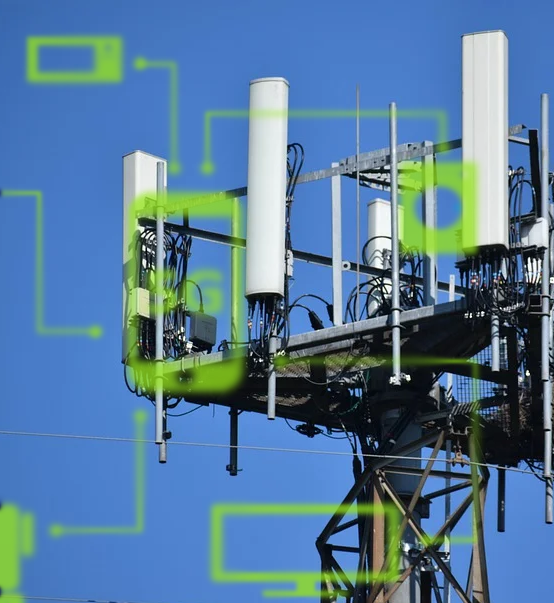
What exactly is 5G? 5G is the next, and fifth, generation of wireless network technology, built to be faster and improve upon the existing 4G network. As 5G began to roll out in 2018, legislation regulating and streamlining it was not far behind. Small cell device and 5G legislation has been introduced in numerous states across the country.
The new 5G technology requires a new telecommunication infrastructure known as small cells, or small cell devices. Local, state, and federal governments have helped these new small cell systems get up and running in a variety of ways. Governments have streamlined permitting at the federal, state, and local levels, rights of way, application timelines, siting and application fees, application review timelines, and appeals processes. Wireless carriers could install between 800,000 and three million small cell antennas across the country over the next ten years.
Before 2019, lawmakers in 21 states enacted some form of small cell or 5G legislation that streamlines these regulations to facilitate the deployment of 5G. Four other states have since joined. In the 2020 legislative session, an additional 16 states have introduced 5G and small cell-related legislation. Where do these bills stand?
2018 FCC Ruling
In 2018, the Federal Communications Commission (FCC) released a declaratory ruling on accelerating wireless broadband deployment by removing barriers to infrastructure investment. According to the FCC’s press release, the decision was an important step to remove regulatory barriers that inhibit the deployment of the necessary infrastructure in order for 5G to thrive. The press release also summarizes the 116-page ruling. The first part of the Commission’s Declaratory Ruling concentrates primarily on local fees for the authorizations necessary to deploy small wireless facilities. Specifically, the Declaratory Ruling:
- Explains when a state or local regulation of wireless infrastructure deployment constitutes an effective prohibition of service prohibited by Sections 253 or 332(c)(7) of the Communications Act;
- Concludes that Section 253 and 332(c)(7) limit state and local governments to charging fees that are no greater than a reasonable approximation of objectively reasonable costs for processing applications and for managing deployments in the rights-of-way;
- Removes uncertainty by identifying specific fee levels for small wireless facility deployments that presumably comply with the relevant standard; and
- Guides when specific state and local non-fee requirements the Act allows—such as aesthetic and undergrounding requirements—may constitute an effective prohibition of service.
The second part of the Commission’s decision, the Third Report & Order in the Wireless Infrastructure Docket:
- Establishes two new shot clocks for small wireless facilities (60 days for collocation on preexisting structures and 90 days for new builds);
- Codifies the existing 90- and 150-day shot clocks for wireless facility deployments that do not qualify as small cells that were established in 2009;
- Concludes that all state and local government authorizations necessary for the deployment of personal wireless service infrastructure are subject to those shot clocks; and
- Adopts a new remedy for missed shot clocks by finding that a failure to act within the new small wireless facility shot clock constitutes a presumptive prohibition on the provision of services.
Arkansas
Arkansas enacted House Bill 1874 in April of 2019, becoming the 23rd state to pass streamlined small cell and 5G legislation. The legislation sets application fees for a permit not to exceed $100 for each small wireless facility or $250 for the installation, modification, or replacement of a pole together with the collocation of an associated small wireless facility in the right of way. The bill also mandates each antenna deployed to be no more than three cubic feet in volume and that each new or modified pole installed in a right of way not to exceed 50 feet in height or 10% taller than the tallest existing pole in the same right of way.
When the governor signed the bill into law, reports indicated the next-generation wireless networks would bring $302 million in economic growth to Little Rock.
Alabama
Small cell and 5G legislation was also introduced recently in Alabama. SB 264, introduced in the 2019 Alabama legislative session, died due to opposition for local officials and the Alabama League of Municipalities because the bill would have limited their control of rights of way and fees and the ability to set their application and approval schedule. For example, the League suggested a $900 per pole fee for access use of an existing utility pole to put a small cell device, in contrast to the bill capping access use of an existing utility pole at $250 per year.
Despite SB 264 not passing, SJR 92 was adopted by the legislature and signed by the governor in June of 2019. The resolution established the Advanced Small Wireless Facilities Deployment Task Force, charged with reviewing and considering small cell legislation passed in other states as well as reviewing federal laws and regulations, including the FCC order. The resolution also charged the task force, comprised of three members of the state House and three members of the state Senate, with drafting proposed legislation for the 2020 session.
In the most recent 2020 legislative session, lawmakers introduced SB 172, which would have set a statewide standard for deploying 5G cellular infrastructure. The League of Municipalities also opposed this bill, still arguing the bill took away too much control from local officials. SB 172’s sponsor, state Senator Arthur Orr, argued the state was losing billions of dollars due to the local opposition. The bill included a $500 application fee cap for the first five small cells and $100 for every additional device, with a one-time fee capped at $1,000 if a wireless provider wishes to build or replace an existing utility pole. The bill also capped annual fees at $270. Orr noted in a committee meeting earlier this year that Georgia has a total cap of $140 in recurring charges and Tennessee has a cap of $100. SB 172 passed the Senate and the House Urban and Rural Development Committee but did not receive any further votes or consideration.
New York
Empire State lawmakers have introduced numerous pieces of small cell and 5G legislation in 2020.
- A01459 and S01949 – will put in place a uniform state siting process for the placement, collocation, modification, and maintenance of wireless facilities. The bill would ease the burden on local governments by reducing their administrative costs, and to incentivize wireless carriers to co-locate their equipment at existing wireless facility sites, rather than to construct new sites;
- A04066 and S03046 – relate to notice requirements and municipal cooperation in wireless facility siting; require notification be provided to municipalities in which wireless facilities are to be sited and to residents within two thousand five hundred feet of proposed wireless facilities;
- A08637 – establishes a temporary commission to study the environmental and health effects of evolving 5G technology;
- A08988 and S07179 – direct the study of the future implementation of fifth and future generation wireless network system technology in the state and specifies which agencies shall conduct such study;
- A10157 and S07922 – direct the study of the health and environmental impact of the implementation of 5G and future generation wireless network system technology and small cell distributed antenna systems in the state; and
- S06071 – relates to small wireless facility development.
A08988 is the only bill above Governor Andrew Cuomo has signed into law. As justification for the bill, it states that there are more wireless phones and devices than people in New York and that the current network capacity is lacking.
Pennsylvania
A bill introduced in the Pennsylvania House, HB 1400, would “provide for the uniform, efficient and predictable regulation of small wireless antennas to improve the provisioning and deployment of the next generation of high-speed wireless broadband throughout the Commonwealth.” Specifically, the bill allows municipalities to charge an annual fee for the use of rights of way, not to exceed $100 per small wireless facility or $100 per new utility pole with a small wireless facility. The bill also limits the maximum height, including the utility pole and the facility, to be no taller than 50 feet off the ground.
The bill, backed by Verizon and AT&T, has been met with pushback. Before the current session, lawmakers had twice failed to advance the bill through the legislative process. Local officials believe the antennas could be installed in residential areas without municipal zoning approvals and could negatively impact the charm of “touristy historic districts.” Some also view the bill in Pennsylvania to be one-sided towards wireless carriers, even subsidizing them. The Pennsylvania Municipal League, Pennsylvania State Association of Boroughs, and the Pennsylvania State Association of Township Commissioners sent a letter to the House Consumer Affairs Committee arguing that the bill renders local zoning control useless, does not solve the lack of rural broadband access problems across the state, and sets lower fees than what the FCC mandated in 2018.
The cosponsor memo for HB 1400 argues that lawmakers changed the bill to address the concerns above by the municipal associations and other stakeholders. The memo also asserts that the bill builds upon the FCC’s mandate and provides guidelines specific to Pennsylvania. While the memo contends the bill preserves local governments’ authority over zoning and land use, including the ability to approve or deny wireless infrastructure siting permit applications, pushback caused a vote on the bill to be canceled last summer.
According to the Pennsylvania Chamber of Business and Industry, a 5G network in Pennsylvania could add approximately $3.5 billion to the state economy. HB 1400 is still awaiting consideration by the House Consumer Affairs Committee.
Federal
Much of the recent conversation in Congress has been around the security of 5G systems. In the Senate’s FY 2021 National Defense Authorization Act (NDAA), the Pentagon would be required to take steps to sever Chinese government access to sensitive defense data that it can glean through telecommunications networks, the materials used in weapons, and pharmaceuticals. The NDAA would mandate that the defense secretary report on the risk to personnel, equipment, and operations posed by China’s Huawei Technologies’ 5G systems used by countries that host U.S. military.
In the House, the FY2021 Financial Service Appropriation Bill (H.R. 7668) would bar the FCC from implementing an April proposal to create a 5G Fund for Rural America, funded through the Universal Service Fund (USF), until it finalizes a map showing the availability of mobile broadband internet access.
In July, the House Energy and Commerce Committee favorably reported several bills that deal with wireless infrastructure security and spectrum management. Among those, H.R. 6624, the USA Telecommunications Act, would provide a grant program to distribute up to $750 million in grants to help deploy interoperable 5G wireless networks.
Latest News
Photo credit: iStock.com/StudioGraphic As technology continues to evolve, digital driver's licenses (also known as mobile IDs) are gaining traction across the United States. States are increasingly exploring legislative measures to modernize driver identification systems, enabling [...]
NetChoice and AI regulation In this episode of the Back in Session podcast, hosts Ryan Stevens and Ryan DeMara sit down with Amy Bos, Director of State and Federal Affairs at NetChoice, to discuss the [...]
Photo credit: iStock.com/yacobchuk The use of cell phones by students in classrooms is on the rise, despite 77% of schools prohibiting cell phones at school for non-academic use. With students often disregarding these rules or [...]
In the latest episode of the "Back in Session" podcast, hosts Ryan Stevens and Ryan DeMara delve into the innovative world of AI technology applied in gun detection with Burgess Nichols from ZeroEyes. Starting with [...]





Stay In Touch